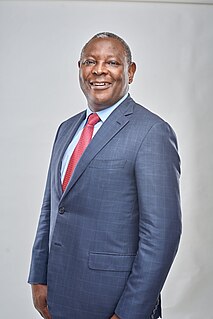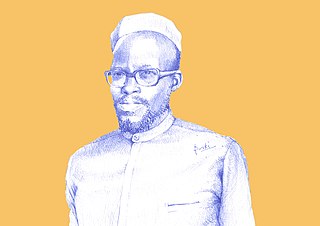Related Research Articles

The Kikuyu are a Bantu ethnic group native to Central Kenya. At a population of 8,148,668 as of 2019, they account for 17.13% of the total population of Kenya, making them the largest ethnic group in Kenya.

Ngũgĩ wa Thiong'o is a Kenyan writer and academic who writes primarily in Gikuyu and who formerly wrote in English. His work includes novels, plays, short stories, and essays, ranging from literary and social criticism to children's literature. He is the founder and editor of the Gikuyu-language journal Mũtĩiri. His short story The Upright Revolution: Or Why Humans Walk Upright, is translated into 100 languages from around the world.

The Okiek, sometimes called the Ogiek or Akiek, are a Southern Nilotic ethnic group native to Tanzania and Southern Kenya, and Western Kenya. In 2019 the ethnic Okiek population was 52,596, although the number of those speaking the Akiek language was as low as 500.

Harry Thuku was a Kenyan politician, one of the pioneers in the development of modern African nationalism in Kenya. He helped found the Young Kikuyu Association and the East African Association before being arrested and exiled from 1922 to 1931. In 1932 he became President of the Kikuyu Central Association, in 1935 founded the Kikuyu Provincial Association, and in 1944 founded the Kenya African Study Union. Opposed to the Mau Mau movement, he later retired to coffee-farming.

Kenyan literature describes literature which comes from Kenya. Kenya has a long oral and written literary tradition, primarily in English and Swahili, the two official languages of the country.

Indians in Kenya are citizens and residents of Kenya with ancestral roots in the Indian subcontinent. Most are found in the major urban areas of Nairobi and Mombasa, with others living in rural areas.

Petals of Blood is a novel written by Ngũgĩ wa Thiong'o and first published in 1977. Set in Kenya just after independence, the story follows four characters – Munira, Abdulla, Wanja, and Karega – whose lives are intertwined due to the Mau Mau rebellion. In order to escape city life, each retreats to the small, pastoral village of Ilmorog. As the novel progresses, the characters deal with the repercussions of the Mau Mau rebellion as well as with a new, rapidly westernizing Kenya.
John Ruganda was Uganda's best known playwright. Beyond his work as a playwright, Ruganda was also a professor at University of North, South Africa, University of Nairobi, and Makerere University.

James Mwangi CBS is a Kenyan accountant, career banker, businessman, and entrepreneur. He is the current Group Managing Director and Group Chief Executive Officer of Equity Group Holdings Plc, the banking conglomerate with one of the largest customer bases on the African continent, over 14 million as of December 2019.
Bahadur Tejani is a Kenyan poet, novelist, playwright and literary critic.

Pio Zirimu was a Ugandan linguist, scholar and literary theorist. He is credited with coining the word "orature" as an alternative to the self-contradictory term, "oral literature" used to refer to the non-written expressive African traditions. Zirimu was also central in reforming the literature syllabus at Makerere University to focus on African literature and culture instead of the English canon.
Lubwa p'Chong was a Ugandan playwright and poet. He founded and edited Nanga, the magazine of the National Teachers College, Kampala, and edited Dhana, the Makerere University literary magazine. His poetry has appeared in East African magazines and anthologies.

Rebeka Njau was Kenya's first female playwright and a pioneer in the representation of African women in literature. Her writing has addressed topics such as female genital mutilation and homosexuality. Her first novel, Ripples in the Pool, appeared as number 203 in the Heinemann African Writers Series.
Muthoni Gachanja Likimani is a Kenyan activist and writer, who has published works of both fiction and non-fiction, as well as children's books. In her career she has also been a broadcaster, actress, teacher and publisher. She was the first Kenyan beauty queen, the first African to establish a public relations firm in Kenya and one of the country's earliest female authors.

Professor David Peter Simon Wasawo was a Kenyan zoologist, conservationist, and university administrator. After studying at Uganda's Makerere University he earned an M.A. at the University of Oxford and a PhD at University of London. He taught at Makerere University, and was Professor and Dean of the Faculty of Science at the University of Nairobi, and later chancellor of Great Lakes University of Kisumu.
Mwangi Ruheni is the pseudonym of Kenyan novelist Nicholas Muraguri best known for his novels The Minister's Daughter (1975) and The Future Leaders (1973), which were published as part of the African Writers Series. Muraguri was trained as a chemist, and spent 22 years as the Chief Government Chemist of Kenya.
Tony Adam Mochama is a Kenyan poet, writer, author and a senior journalist at The Nation Media Group. Mochama is a three-time winner of the Burt Awards for African Young Adult Literature and he is also a recipient of Miles Morland Writing Scholarship.
The Nairobi–Nakuru–Mau Summit Highway is a road in Kenya, connecting the capital city of Nairobi, in Nairobi County, with the towns of Naivasha, Nakuru and Mau Summit, in Nakuru County.
John Cato Nottingham was a British-born Kenyan colonial administrator, political activist, and publicist.
Busara was a literary journal published quarterly by the East African Publishing House, and later biannually, by the English Department at the University of Nairobi. It was first published under that name in 1968, and became one of the most influential literary journals of its time in Kenya. Jared Angira became its editor in chief in 1969.
References
- ↑ Ruth L. Makotsi; Lily Nyariki (1997). Publishing and Book Trade in Kenya. East African Publishers. p. 26. ISBN 978-9966-46-664-8.
- ↑ UNESCO, Cultural industries: a challenge for the future, UNESCO, 1982, p.177.
- ↑ 'Interview with John Nottingham', in Glen Bailey, ed., Papers in International Studies: Africa series, 1980, pp.111-2
- ↑ International Association of School Librarianship, 13th Annual Conference Proceedings , 1984, p.353.
- ↑ Mwangi, Douglas M. (2015). Publishing outposts on the Kenyan literary landscape: a critique of Busara, Mũtiiri and Kwani? (Thesis). University of Nairobi. pp. 4–5. Retrieved 1 November 2020.
- ↑ John Nottingham, 'Establishing an African publishing industry: a study in decolonization', African Affairs , Vol. 68, No. 271 (April 1969), pp.139-44.
- ↑ John Kamau, John Nottingham: Briton who sought justice for Mau Mau fighters, Daily Nation , 24 February 2018.
- ↑ Evan Mwangi (2007). "Publishing". In Simon Gikandi; Evan Mwangi (eds.). The Columbia Guide to East African Literature in English Since 1945. Columbia University Press. p. 151. ISBN 978-0-231-12520-8.